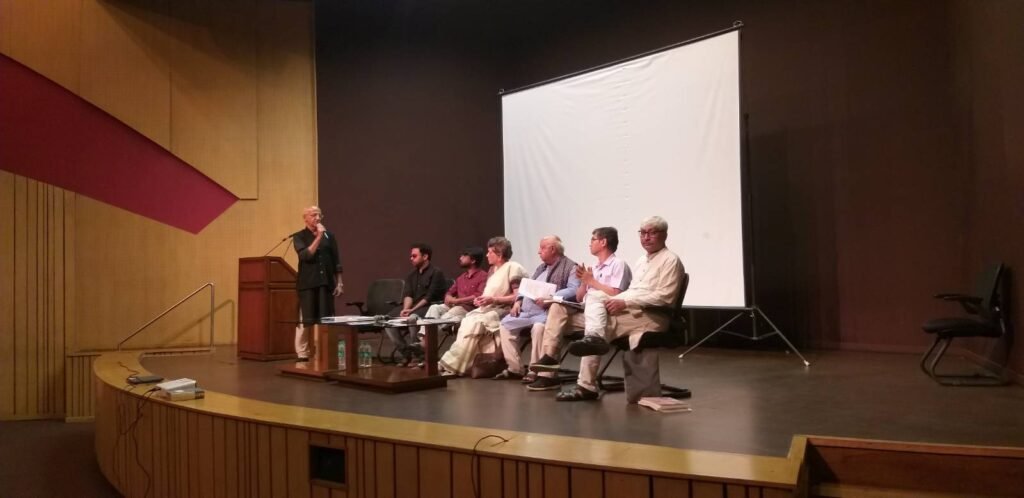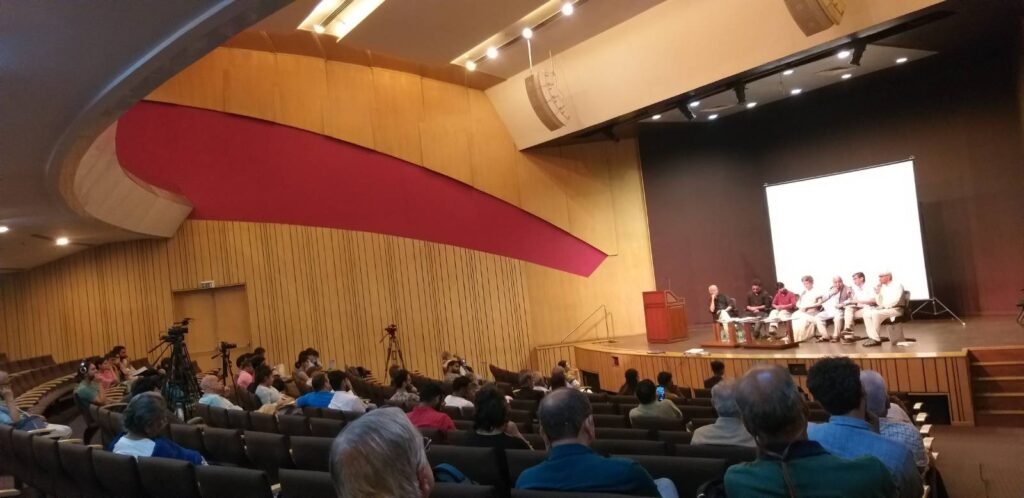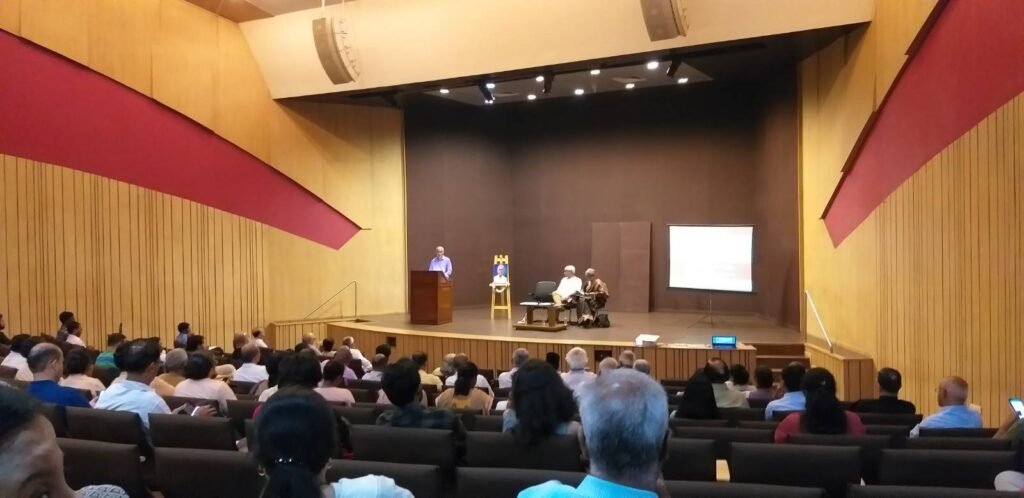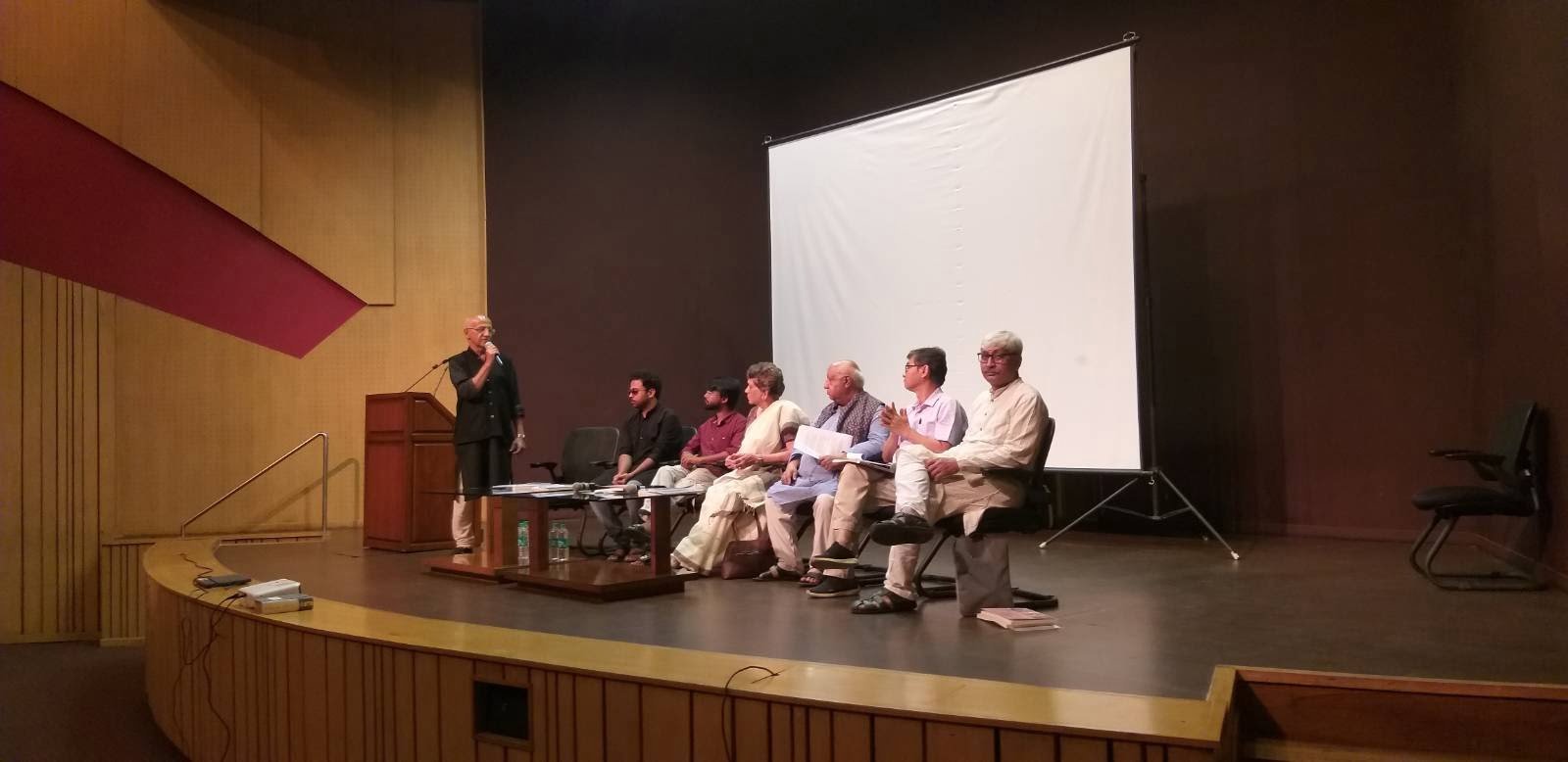Press Release
On 11th July 2023, Karwan-e-Mohabbat conducted a film screening and a panel discussion on the theme ‘Mazhab Nahi Sikhata…Weaponising Religion: Maharashtra, Manipur, Uttarakhand, and Ram Navami Procession” at Jawahar Bhawan Auditorium, Dr Rajendra Prasad Road, New Delhi from 5:30 pm onwards.
In light of the instances of hate violence and hate speeches across different states, a film screening and panel discussion was organised by the campaign for conscience and solidarity Karwan-e-Mohabbat at Jawahar Bhawan auditorium in New Delhi to reflect on this phenomenon and the legal and political challenges that marginalised groups and progressive sections have to face in these times.

On this occasion a documentary film shot and directed by Karwan Media Fellow Imaad-ul-Hasan on the series of hate speeches delivered at more than 60 rallies organised by a coalition of right wing hindutva groups named Sakal Hindu Samaj in the last few months, and the ensuing communal violence. The panel discussion was moderated by peace worker and author Dr Harsh Mander. The panel consisted of distinguished academicians, civil society activists and journalists including Prof Neera Chandhoke, Prof Apoorvanand, retired civil servant Amitabha Pandey, prominent journalist Anmol Pritam, senior activist from Manipur Babloo Loitongbam Singh, and Karwan e Mohabbat media fellow Imaad ul Hasan.

The event began with a welcome address by veteran journalist and human rights activist John Dayal. He noted that after the Covid-19 pandemic, the Karwan campaign has finally been able to resume its journey to corners of the country where instances of hate violence are taking place to express their solidarity and discover truths about these incidents. He also made a call for young people to join them on Karwan’s journeys.
A short film ‘Mazhab’ by the Karwan Team was screened to anchor the secular, democratic and harmonious spirit of the Karwan-e-Mohabbat movement.
A documentary film Maharashtra In the Wake of Hate created by young filmmaker Imaad ul Hasan was previewed which presented some of the hate speeches in the 60 rallies organised recently by the Sakal Hindu Samaj in Maharashtra. It showcased the brutality of the violence that occurred as a consequence of these speeches, administrative complicity and police inaction in these cases. The film also featured analyses by journalists, lawyers, and jurists who have closely worked on the issue of hate speeches and the related violence.

Dr Harsh Mander reflected on the film and the phenomenon of hate speeches and connected these instances to the rise of right-wing ideology in the past few years across states. He invited Babloo Lointongbam Singh, an anthropologist and senior peace activist from Manipur, and Anmol Pritam, a journalist with the Newslaundry who has extensively documented the politics behind the instances of ‘Love Jihad’ in Uttarakhand, to give their assessment of these realities in the two states.
Babloo Loitongbam Singh, sharing his experiences from the on-ground violence in Manipur, explained the history of the conflicts among the Nagas, the Kukis, and the Meiteis; and how each of these groups has been used by the Indian state to curb the uprisings and insurgency led by the other groups. He stated that the exception that was the extremist violent militancy in the North-East of India and the state of Jammu & Kashmir, has been normalised across the country by the present regime at the centre. He revealed that “Manipuris amount to 0.4 per cent of India’s population but 64 per cent Manipuris have been booked under UAPA even before the BJP government came to power.”. He criticised the silence of state authorities and said, “in Europe, the Manipur situation is being compared to what is happening in Syria and similar conflicted areas across the world. The European Parliament is ready to pass a resolution to help Manipur but the Prime Minister of India has nothing to say.” Loitongbam further talked about the elimination of civil societies in Manipur. He said that the vacuum created by the absence of civil societies is being filled by the right-wing religious groups who have taken over the public sphere and have complete impunity to carry out acts of violence.
Journalist Anmol Pritam recounted his experiences from reporting on ground in Uttarakhand and highlighted the processes of manufacturing communal tensions in the state. Anmol narrated how a local incident of kidnapping was manipulated and turned into a campaign against ‘Love Jihad’ by local Hindu groups because one of the accused was a Muslim. It led to an economic boycott and the targeting of Muslim traders and their shops by the local trade association who enjoy support from local BJP leaders. Anmol also spoke of the role of Swami Darshan Bharti, founder of the right wing hindutva organisation Devbhoomi Raksha Abhiyan in fomenting hate and violence against the Muslim community in Purola town of Uttarakhand. He stated, “nearly 40 to 45 Muslim families left the village after their shops were attacked and there are merely 300-400 Muslim families living in the area. Local newspapers and media persons also played an important role to agitate the Hindu population by publishing news reports about Love Jihad.”
Dr Mander, based on his work and experiences from Germany, noted that “the Holocaust didn’t begin in gas chambers, it began with hate speech” while extending his gratitude to Babloo, Anmol and Imaad for sharing their brave testimonies of how the politics of today is using religion and ethnicity to create deep divides in our society. He then urged panellists Amitabha Pande, Apoorvanand and Neera Chandoke for their perspectives on these instances.
Amitabha Pande, retired IAS officer, highlighted the larger implications of hate speech and how it locates itself in the larger right-wing Hindutva ideological framework. He spoke of the shared cultural history of hindu-muslim relations in the Indian subcontinent and how we have come to the times today where the Hindu identity is being defined in terms of its hatred of the Muslims. He claimed that communal hate has been the most dominant dimension of the current regimes, seeped into the institution, laws, personnel etc., completely different from earlier versions of hate – embedded in governance and public policy. He also mentioned that violence today is deliberate and planned, arguing that “the Hindu of today is a creature of hindutva and Hindutva is the religion of the nation state. Muslims as well as all other groups that stand against the injustices of the ruling government are the convenient other.” He urged civil society groups and progressive citizenry to interrogate ourselves in order to create a radically different discourse.
Apoorvanand, Professor of Hindi Literature at the University of Delhi, began with sharing how they moved to the Supreme Court and then subsequently on its instructions to the Uttarakhand High Court with a petition urging the cancellation of the Mahapanchayat scheduled to be organised on June 15 this year by the hindutva groups with a stated objective to boycott and evict the muslim community from the town of Purola. Prof Apoorvanand emphasised that the hate violence being orchestrated in Indian society today is structural and organised. In his view, this is being wilfully ignored by the judiciary. Through various instances, he illustrated the ongoing psycho-social pogrom against the Indian muslims by various state and non-state actors. Significantly, he pointed out, it is only an equal rule of law in the country that can ensure that the prejudices of the majority do not materialise into hate violence against the minorities.
Neera Chandhoke, former Professor of Political Science at University of Delhi, began with an illustration from Shakespeare’s play Julius Caesar, evoking the figure of the popular tyrant. Prof Chandhoke underlined the crucial point that democracy is possible only if there are responsible citizens. She said that in today’s politics of spectacles we are becoming well versed into a shared language of hatred which has turned us from citizens to mere subjects that are a mute audience to the performance of violent communal spectacles. She opined that the politics of state shapes the state of politics in the society.
The panel discussion concluded with questions and comments from the audience, which included students, scholars, persons from the media and civil society groups, and concluding remarks from the panellists.
Vote of thanks was delivered by Mohd Aamir Khan, Karwan-e-Mohabbat.

Leave a Reply